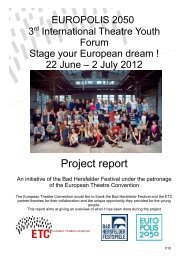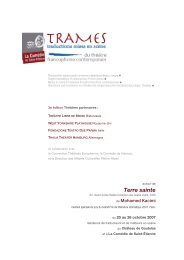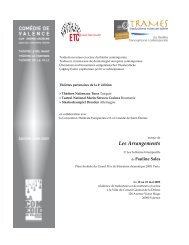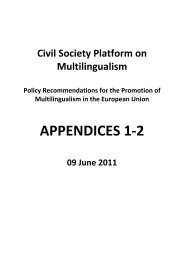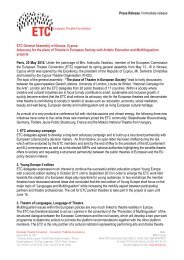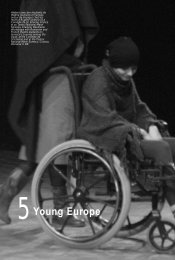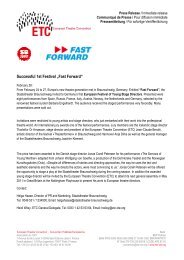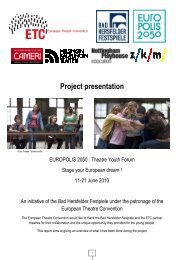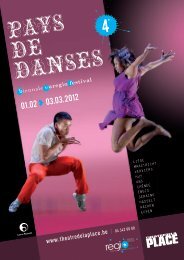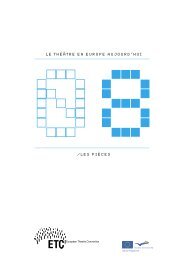Le théâtre en Europe aujourd'hui - European Theatre Convention
Le théâtre en Europe aujourd'hui - European Theatre Convention
Le théâtre en Europe aujourd'hui - European Theatre Convention
You also want an ePaper? Increase the reach of your titles
YUMPU automatically turns print PDFs into web optimized ePapers that Google loves.
poland<br />
> polska<br />
pologne<br />
+ info<br />
> www.etc-cte.org<br />
118<br />
ADDRESS/ADRESSE<br />
Jana Pawła II Street 41/66<br />
38-500 Sanok<br />
T: + 48 502 342 054<br />
E: m.walcza@sgh.waw.pl<br />
><br />
WORKS/ŒUVRES<br />
Piaskownica ‘The Sand-pit’ (2002)<br />
PREMIERE/CRÉATION<br />
Jerzy Szaniawski Drama <strong>Theatre</strong>,<br />
Wałbrzych<br />
10.09.04<br />
DIRECTOR/METTEUR EN SCÈNE<br />
Piotr Kruszczyński<br />
ADDRESS/ADRESSE<br />
Teatr Powszechny im. Jerzego<br />
Szaniawskiego<br />
pl. Teatralny 1<br />
58-300 Wałbrzych<br />
T: + 48 74 664 96 93<br />
E: teatr@teatr.walbrzych.pl<br />
PUBLISHER/EDITEUR<br />
Dialog (8/2004)<br />
al. Niepodegłos´ci 213<br />
02-086 Warszawa<br />
T: + 48 22 608 28 80<br />
AWARDS/PRIX<br />
Bydgoszcz World Première Festival/<br />
Bydgoszcz Festival des créations<br />
mondiales (2003, 2004)<br />
CHARACTERS/PERSONNAGES<br />
10 male/hommes<br />
4 female/femmes<br />
Michał Walczak 1979<br />
kopalnia<br />
the mine<br />
la mine<br />
This play was commissioned by the Wałbrzych theatre. The drama,<br />
whose str<strong>en</strong>gth ultimately lies in metaphor, not in realism or in<br />
literal meaning, is about a mining town that goes into decline<br />
after the last mine closes. The citiz<strong>en</strong>s lose their jobs and reason<br />
for being; they cannot find their place in the incompreh<strong>en</strong>sible,<br />
overpowering new reality. They remain stuck motionlessly in the<br />
pres<strong>en</strong>t: they recall the past, they dream of a better life. The city<br />
speaks through the lips of old Walek, who likes talking with his<br />
philosophically inclined Dog. “It is hard to be a town nowadays,”<br />
says Walek. “The streets ache, something stings... You must stick<br />
somewhere on the map and not move.” Sudd<strong>en</strong>ly, a Stranger<br />
appears in the middle of the aching, ruined city. Does he exist only in<br />
the dreams of those for whom he seems to promise fulfilm<strong>en</strong>t? Only<br />
Walek knows that the Stranger has come to “take him to where all<br />
those whose time has come to an <strong>en</strong>d must go”. Wh<strong>en</strong> the old man<br />
gets killed by the car of the Que<strong>en</strong>-Parliam<strong>en</strong>tarian, the Stranger<br />
disappears, and Walek’s grandson Adzio, helplessly in love with<br />
Julia, op<strong>en</strong>s a restaurant with the inherited money. He calls it ‘The<br />
Mine’ and keeps telling the story of his grandfather-town there, for<br />
“things that happ<strong>en</strong> on the surface of yourself, are not important;<br />
what is important is what happ<strong>en</strong>s deep inside and what can be<br />
brought forth, and giv<strong>en</strong> to the other people, to your relatives in<br />
particular”.<br />
Cette pièce est une commande du <strong>théâtre</strong> de Wałbrzych. La force de<br />
son style se situe dans les métaphores et non pas dans le réalisme<br />
ou le s<strong>en</strong>s littéraire. <strong>Le</strong> drame parle d’une cité minière qui dépérit<br />
après la fermeture de la dernière mine. <strong>Le</strong>s habitants ont perdu<br />
leur travail et leur raison d’être. Ils ne peuv<strong>en</strong>t pas trouver de place<br />
dans cette nouvelle réalité incompréh<strong>en</strong>sible et accablante pour<br />
eux. Immobiles, ils s’y trouv<strong>en</strong>t bloqués : ils se rappell<strong>en</strong>t le passé,<br />
rêv<strong>en</strong>t d’une vie meilleure. Et la ville parle à travers la bouche du<br />
vieux Walek qui aime converser avec son chi<strong>en</strong> aux dispositions<br />
philosophiques. « C’est difficile d’être une ville de nos jours », dit<br />
Walek. « <strong>Le</strong>s rues font mal, quelque chose pique... Tu dois te fixer<br />
quelque part sur la carte et ne plus bouger. » Tout d’un coup, un<br />
Étranger arrive au milieu de la ville douloureuse et ruinée. Est-ce<br />
seulem<strong>en</strong>t dans les rêves de ceux auxquels il semble promettre<br />
l’accomplissem<strong>en</strong>t ? Walek seul sait que l’Étranger est v<strong>en</strong>u pour<br />
« l’emm<strong>en</strong>er là où toutes les choses vont quand elles arriv<strong>en</strong>t à<br />
leur terme ». Lorsque le vieil homme est tué par la voiture d’un<br />
parlem<strong>en</strong>taire, l’ Étranger disparaît et le petit-fils de Walek, Adzio<br />
– qui est très amoureux de Julia – ouvre un restaurant grâce à<br />
l’arg<strong>en</strong>t hérité. Il l’appelle « La Mine » et continue à y raconter<br />
les histoires de la ville de son grand-père, car « les choses qui<br />
arriv<strong>en</strong>t à la surface de soi-même ne sont pas importantes. Ce qui<br />
est important arrive profondém<strong>en</strong>t à l’intérieur et peut être ressorti<br />
pour être donné aux autres, particulièrem<strong>en</strong>t aux proches. »



